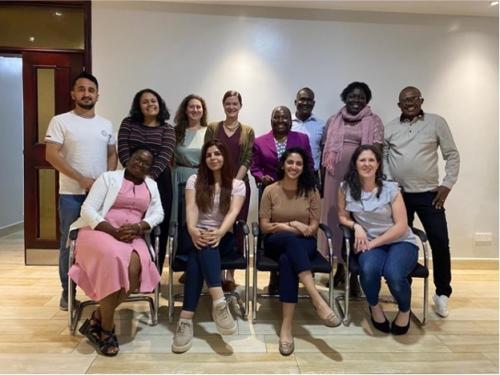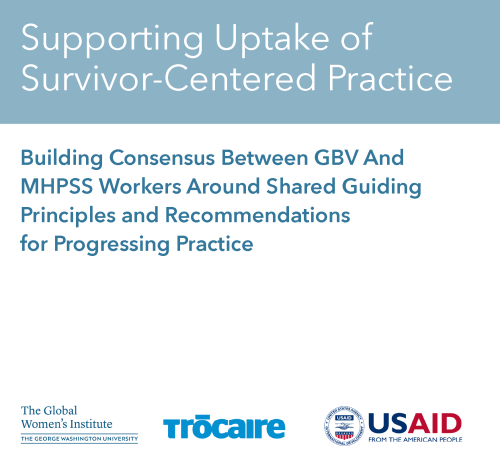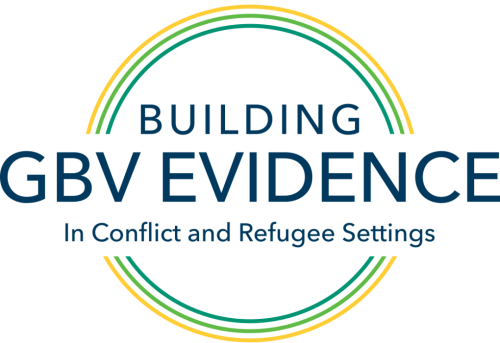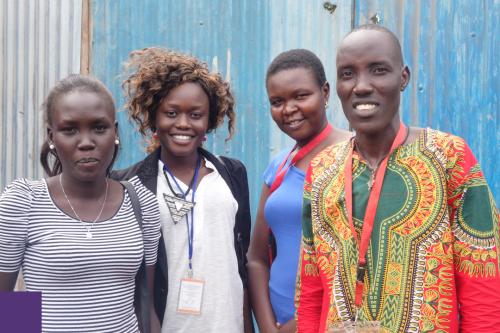Conflict & Crisis
Violence against women and girls (VAWG) is a pervasive problem around the world that frequently intensifies further in times of armed conflict, state instability, or humanitarian crisis. There are critical gaps in research, policy and programmatic work to address violence against women and girls in armed conflict and humanitarian emergencies. GWI seeks to support women and girls affected by these crisis by conducting research on how they experience violence and identifying best practices to deliver better programming to prevent and respond to this violence.
Read more about some of our recent work in conflict and crisis settings below.
Empowered Aid: Transforming gender and power dynamics in the delivery of humanitarian aid
Since its magnitude first came to light in 2002, the humanitarian aid community’s focus on addressing sexual exploitation and abuse (SEA) has primarily rested on establishing reporting mechanisms and punitive actions against perpetrators of such violence, and only recently shifted toward documented, pro-active measures to mitigate risk and prevent abuse and exploitation from occurring. This project seeks to further examine the mechanisms through which aid—namely food, shelter, water & sanitation, fuel & firewood, and cash assistance—is delivered, and how these processes might inadvertently increase the risks of SEA within affected populations, in order to address them. Its goal is to support the creation or adaptation of aid delivery models that actively work to reduce power disparities and give women and girls a sustained voice in how aid is delivered.
The project utilizes participatory action research, a method that proactively acknowledges and addresses power imbalances between the affected population & researchers/humanitarians. Just as participation lies at the center of humanitarian response, it is a critical element in applied, operational research. The project is grounded in formative ethnographic work with refugee women and girls, to safely take an active role in asking and answering questions about their own lives.
Together with GWI and operational partner agencies—CARE International and URDA in Lebanon, and the International Rescue Committee and World Vision in Uganda—members of the affected population help guide the identification and prioritization of ways to make aid distributions safer. These are tested in small-scale pilots in ongoing humanitarian aid operations. Lessons as well as tools used in these pilots will be documented and shared with the humanitarian community, in order to improve practice and reduce the risks for women and girls when receiving aid distributions.
You can find more information on our Empowered Aid page. Our Empowered Aid reports and briefs are available on our Empowered Aid Resources tab.
Putting Survivors at the Center: Creating New Programming Models for Non-GBV Specialist Organizations to Support GBV Survivors
In partnership with Women for Women International (WfWI) and with funding from USAID's Bureau of Humanitarian Assistance, GWI is implementing a new program titled Putting Survivors at the Center: Creating New Programming Models for Non-GBV Specialist Organizations to Support GBV Survivors.
The aim of this project is to develop new programming models that build the capacity of organizations that are not specialized in GBV service provision - to better support GBV survivors who spontaneously disclose cases of violence. The program is taking place in three countries: the Democratic Republic of Congo, Iraq, and South Sudan, and is being implemented over three distinct phases.
You can learn more about Putting Survivors at the Center on our project website.
Supporting Uptake of Survivor-Centered Practice: Building Consensus Between GBV And MHPSS Workers Around Shared Guiding Principles and Recommendations for Progressing Practice
Ensuring that service providers are equipped to provide safe, effective, and survivor-centered mental health and psychosocial support (MHPSS) to women and girls who have experienced GBV is critical, especially in humanitarian settings where resources are often limited.
The resources shared below are based on a dedicated project led by the Global Women’s Institute (GWI) at George Washington University and Trócaire with funding from USAID’s Bureau for Humanitarian Assistance (BHA). This project explored the intersections of MHPSS and GBV response in order to build consensus between both sectors on what constitutes survivor-centered MHPSS interventions and approaches to GBV survivors in humanitarian settings.
This resource consists of five (5) learning briefs and guidance notes, each accompanied by a short video and job aids (infographics). The resource package is available in Arabic, Burmese, English, French, Somali, and Spanish.
Explore the full set of documents and job aids, organized by language, in the folder linked here, and the videos on our YouTube channel.
Building GBV Evidence
GWI's Building GBV Evidence program aimed to build GBV global capacity through the local development and implementation of evidence-building activities including standalone research and improved M&E systems among refugee populations. The Building GBV Evidence program had three major components: the Building GBV Evidence Course, a free self-paced virtual course on ethical and safe research, monitoring and evaluation of GBV programs; no-cost individualized, in-kind technical advising and support for humanitarian agencies on gender-informed M&E/research; and small grants for humanitarian agencies and academics in the global south to conduct their own research and bridge knowledge gaps. Under this third pillar, we worked with Jago Nari Unnayon Sangsta (JNUS) in Bangladesh and Right to Play International in Lebanon and Uganda to conduct research projects to improve staff safety and develop new ways to measure gender norms in humanitarian settings, The Building GBV Evidence program was funded by the US State Department Bureau of Population, Refugees, and Migration (PRM).
You can find more information on our Building GBV Evidence program website.
South Sudan: Pioneering Research in Conflict Settings
The Global Women's Institute (GWI) conducted the first large-scale, population-based study of violence against women and girls (VAWG) in South Sudan, one of the world's most intractable conflict regions. The research utilized both quantitative and participatory qualitative techniques to document the experiences of women and girls, as well as of men and boys. In some areas, as many as 70 percent of women have experienced sexual and/or physical intimate partner violence, and one in three women have experienced some form of sexual abuse, including rape and transactional sex.
This project formed part of the What Works to Prevent Violence Against Women and Girls program, a flagship program supported by the Government of the United Kingdom.
Mitigating Risk of GBV in Cash Assistance in Humanitarian Settings: M&E indicators and guidance note
This indicators guide was developed through a collaboration launched by UNFPA and GWI in 2022 to examine GBV risk in relation to cash assistance. It offers proxy indicators for use by non-GBV specialists, such as cash, M&E, or sectoral/program actors, for assessing GBV risks to women in cash interventions. The indicators were developed to be included in the assessment, design, monitoring and/or evaluation phases of cash interventions. The indicators guide is available in English, Spanish, Fre
The accompanying case study explores the findings and implications of the operational field research conducted in Iraq and Colombia to inform the development of these indicators. The case study is available in English and Spanish.
This work builds on ongoing GBV risk mitigation work by UNFPA, the GBV AoR, and other humanitarian agencies. The guide and case study can also be accessed on the GBV AoR website, along with other resources for GBV risk mitigation in cash and voucher assistance.








